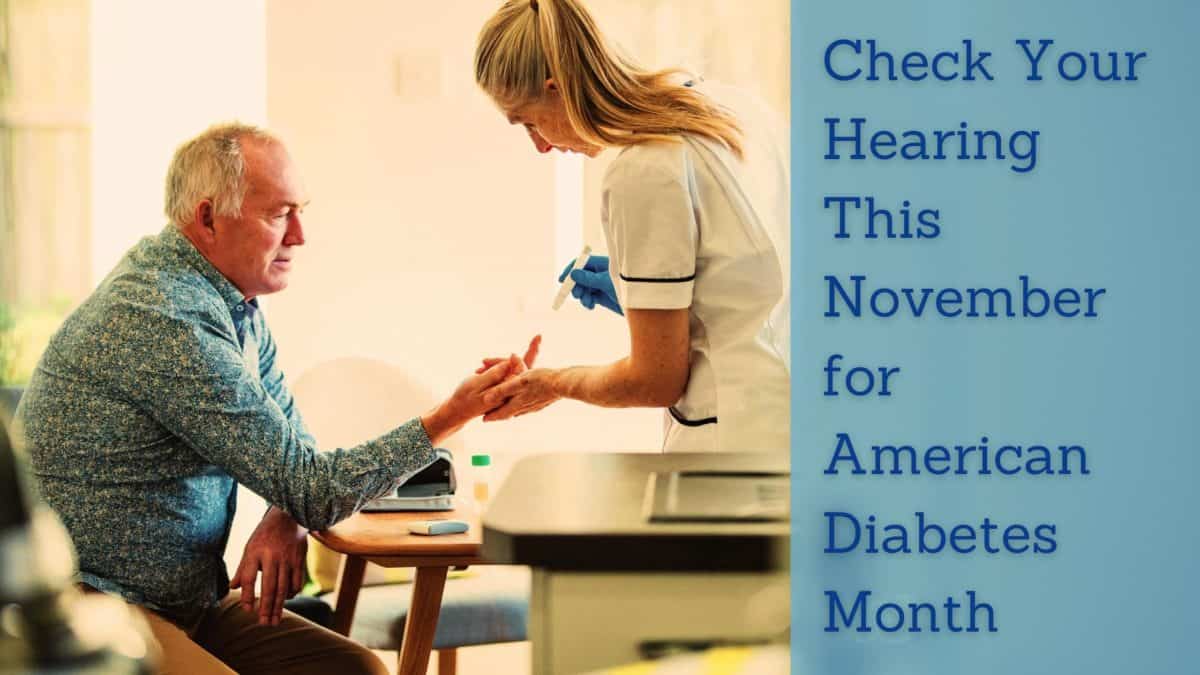- How to Recognize the First Signs of Hearing Loss - June 5, 2025
- Understanding the Connection Between Tinnitus and Weather - May 17, 2025
- The Most Unexpected Reasons Hearing Aids Can Malfunction - May 9, 2025
Some of the major health risks deserve our concerted attention, and many have been designated with a month to raise awareness and to promote research. Among these other concerns, American Diabetes Month takes place each November.
We take the opportunity to recognize the efforts of healthcare workers who give their energies to diabetes treatment and care. We also look to the doctors and researchers who continue to pursue ever-better treatments and responses to the condition. We also remember the work—sometimes, the thankless work—of those who provide care for their family members and loved ones with diabetes. Finally, we consider the needs of those who already have a diagnosis of diabetes or pre-diabetes, encouraging our communities to extend care and the best resources we have to offer.
Did you know that paying attention to hearing loss is one way to celebrate American Diabetes Month? You might be wondering how two so different conditions are related, and you would not be alone.
Specialists and researchers are working to better understand how diabetes and hearing loss are connected. And yet, we know that those who have diabetes demonstrate double the rate of hearing loss than the population without diabetes. Even those with pre-diabetes are at higher risk. Those who have a blood glucose level that is sufficient to bring a diagnosis of pre-diabetes are 30 percent more likely to have hearing loss than the population without elevated blood glucose.
With these statistics in mind, there is a lot we can do to focus the attention of the diabetes community on hearing loss. Whether you are a caregiver, a diabetes professional, or if you have diabetes yourself, this November is a great opportunity to shift your focus onto what you can do to understand hearing loss.
Diabetes and Organ Failure
One of the effects of diabetes can be organ failure. How does that work? When a person has diabetes, the glucose level in the blood is very high. That high level of blood glucose can cause harmful effects on the blood vessels or directly through a lack of oxygenated blood to the organs. Some of the known effects of diabetes include eye failure and kidney failure. In these cases, experts believe that the high blood glucose associated with diabetes can lead to blood vessel damage, thereby harming the organs that are supplied by those vessels. It is possible that the relationship between diabetes and hearing loss works the same way. When a person experiences damage to the tiny blood vessels near the ears, that cut off the supply of blood can harm the stereocilia—the hairlike organelles of the inner ear that sense and transmit sonic information to the brain. The very sensitivity that makes the stereocilia capable of performing their job is also what makes them prone to damage. Once the stereocilia have been damaged, they do not regenerate on their own, making it necessary to receive treatment for hearing loss in the form of hearing aids or other tools.
Testing and Treatment
If you or someone you love has pre-diabetes or diabetes, it is important to get regular hearing tests. Not all people with diabetes and pre-diabetes develop hearing loss, but the rates are much higher than among those who do not have the conditions. Hearing tests are important to identify treatment if needed.
Treating hearing loss can bring benefits to your overall physical and mental health. Incidents of falls and accidents are higher amongst people with untreated hearing loss. Additionally, you may experience communication challenges and social isolation that often accompany untreated hearing loss. Even your cognitive health can suffer through the loss of communication ability.
When you add the connection with diabetes to this list, you can see that it is more important than ever to get a hearing test right away! Once you have a thorough diagnosis, you will not need to miss another day of treatment for your hearing. Why not take advantage of the opportunity provided by American Diabetes Month this November to get the test and treatment? Contact us today!

